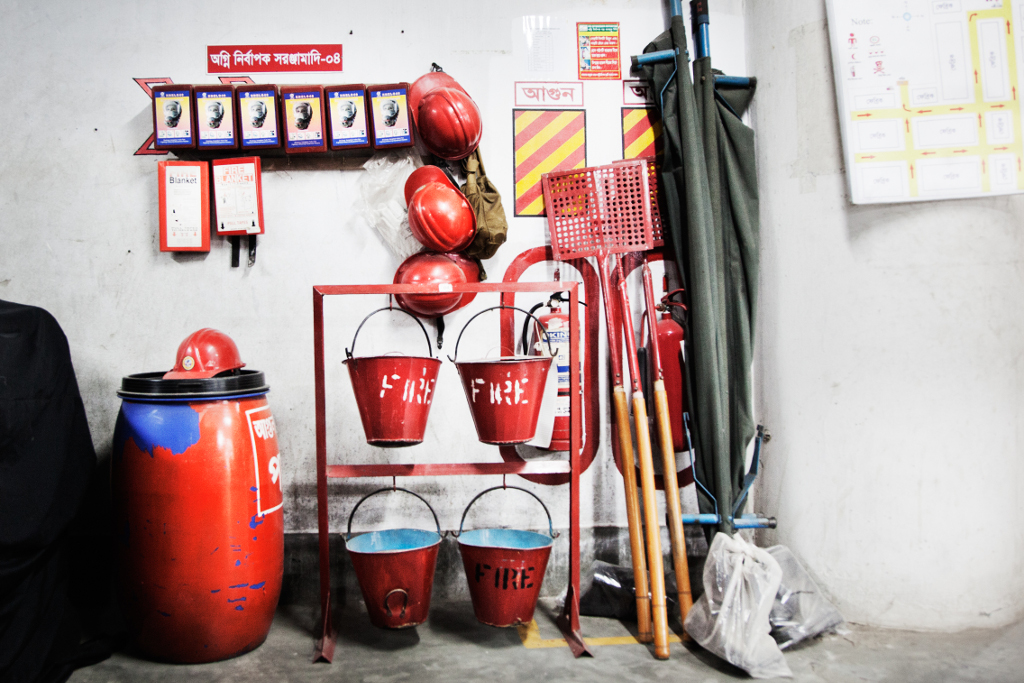
Bangladesh factory explosion shows need to expand Accord inspections to boilers
A boiler explosion at the Multifabs Ltd. factory in Bangladesh yesterday killed at least 10 people, injured dozens more and led to a partial collapse of the factory. We extend our condolences to the families that lost loved ones in this terrible incident and our thoughts are with them and with those who were injured.
The boiler explosion shows the danger of poorly maintained and uninspected boilers in the garment industry in Bangladesh.
Boilers are currently not covered under the inspections of the Accord on Fire and Building Safety in Bangladesh, which stipulates that the boiler room be separated from the rest of the factory with fire-rated construction, but does not include inspections of the boilers themselves to detect explosion risk. Fire separation alone is an insufficient measure, since, as in yesterday’s disaster, the explosion of a defective boiler can be powerful enough to breach the walls of the room in which it is contained, spreading fire and/or causing structural damage.
The only way to fully protect against the possibility of a boiler explosion is to ensure the integrity of the boiler.
The Accord safety standard, and the Accord inspection program, must be immediately expanded to cover boilers. The Accord Steering Committee, its leadership body, will need to approve this modification to the Accord safety standard and the Accord’s inspectorate will need to add technical capacity for this purpose. Both should be done without delay and a program to inspect all boilers in factories product for Accord signatory brands and retailers should be swiftly launched.
The Accord’s Witness Signatories have advocated since 2014 for the Accord to cover boilers. We called for this again, last year, after a fatal boiler explosion at a factory making plastic packaging, unrelated to the garment industry. It should not have required a major disaster in a garment factory to compel brands and retailers to act.
In addition to the issue of boilers, the Accord must address other safety hazards that have caused accidents, injury and death in garment factories, but which are outside the scope of the Accord program. This includes defects in factory generators, gas lines and freight elevators.
The Accord has an extensive and proven safety inspection and remediation program and it must cover all significant threats to building safety.
The Bangladesh government, apparel brands and factory owners have a responsibility to provide remedy following safety failures. They should now ensure a swift process to provide the families affected by the boiler explosion and collapse at Multifabs Ltd with all medical care necessary as well as full and fair compensation.
We are still in the processes of confirming which brands sourced from the factory. Several sources show that Accord members Aldi Nord and Süd, Dansk Supermarked, Lindex, Metro AG, Stockmann and Takko produced at the factory. Other brands listed on the factory website as currently or recently having orders at the factory are Gorfactory, HFG, Hubermasche, Littlewoods, Mitsubishi Corporation Fashion, Newbody, Rex Holm, ScanWear, Seppälä, and Zolla.
Multifabs Ltd. also produced for at least one brand that is a member of the Alliance for Bangladesh Worker Safety, a corporate-run building safety scheme comprised mainly of US and Canadian brands and retailers. The Alliance does not cover the safety of boilers. The factory appears on the Alliance website and whichever Alliance brand used the factory in the past should identify itself and contribute to compensation and medical care for the victims at Multifabs Ltd.
Last week, a three-year post-2018 renewal of the Accord was announced by global unions IndustriALL and UNI. We urge all brands and retailers that source apparel from Bangladesh to sign this new Accord to continue its work towards preventing these tragedies in the future.
The is a statement of the Witness Signatories of the Accord on Fire and Building Safety in Bangladesh, Clean Clothes Campaign, International Labor Rights Forum, Worker Rights Consortium and Maquila Solidarity Network, concerning the boiler explosion at Multifabs, Ltd.